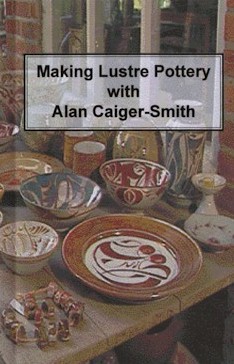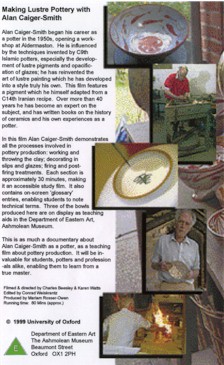 |
Alan Caiger-Smith began
his career as a potter in the 1950s, opening a workshop
at Aldermaston. He is influenced by the techniques
invented by C9th Islamic potters, especially the
development of lustre pigments and opacification of
glazes; he has re-invented the art of lustre painting
which he has developed into a style truly his own. This
film features a pigment which he himself adapted from a
C14th Iranian recipe. Over more than 40 years he has
become an expert on the subject, and has written books on
the history of ceramics and his own experiences as a
potter. In this film Alan Caiger-Smith demonstrates all the processes involved in pottery production: working and throwing the clay; decorating in slips and glazes; firing and post-firing treatments. Each section is approximately 30 minutes, making it an accessible study film. It also contains on-screen ‘glossary’ entries, enabling students to note technical terms. Three of the bowls produced here are on display as teaching aids in the Department of Eastern Art, Ashmolean Museum. This is as much a documentary about Alan Caiger-Smith as a potter, as a teaching film about pottery production. It will be invaluable for students, potters and professionals alike, enabling them to learn from a true master. |
